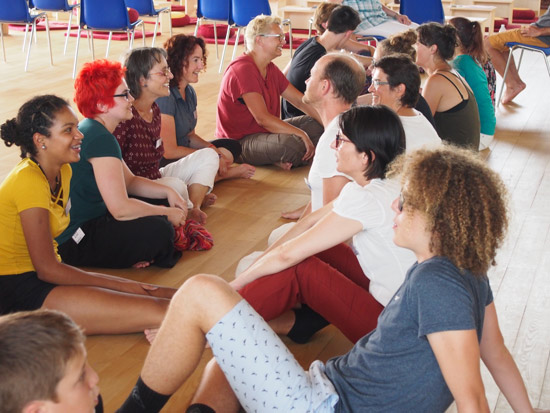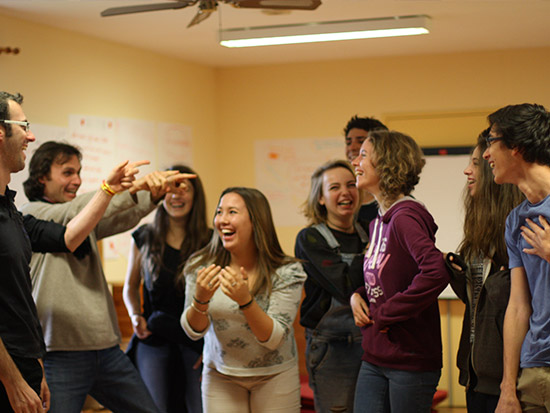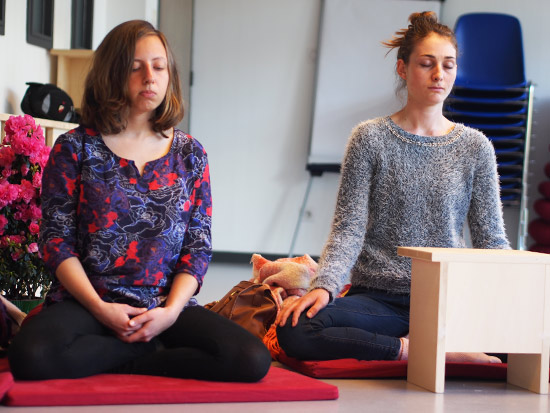Here is an article by Lama Puntso for the magazine “Regard Bouddhiste” (n°8 | janvier-février 2015) which devoted an issue to the subject of education.
Get a glimpse of the value of Dhagpo’s courses for young people.
 You can download the article in PDF form (in French).
You can download the article in PDF form (in French).
Or read it here.
Key Ideas
LIVE FREE
By Lama Puntso. Photos © DKL Media – Nybou
Adolescence is a delicate time of transformation, but it is also a period full of resources and new potentials that offer the means to make pertinent life choices. I saw that first hand in directing the « Stages ados: live free » held in a Buddhist study and meditation centre. (1): between ten and twenty teenagers, during five days with several organizers. By drawing on the Buddha’s teaching with appropriate activities, we give teenagers the means to understand their situation and their environment, to think for themselves. The object? To collectively find the resources to be able to individually make good choices, all the while considering other people.
A FEW REFLECTIONS FROM THESE COURSES
The teens that participate bring with them both a hunger for meaning and a need for stability. The three exercises are a good place to start. In our context, these exercises can be defined as:
■ Ethics: a manner of organizing one’s life or the framework that allows us to grow in a correct manner
■ Meditation: a group of methods that pacify the mind. It opens to another mode of knowledge, to actualize the potential present in everyone.
■ Discernment: the capacity to think for oneself, to understand what is at stake in situations, to become autonomous.
These definitions are of course partial, in accordance with our tradition, but they provide a base to allow teens to clarify their mind and learn to act in the world which is theirs. In his book Live Free, advice for teens (2), Jigmé Rinpoche explains: “it is important to exceed yourself, to get through life situations to create something good for our selves. (…) It is not necessary just put up with situations. And even if we are teenagers, we can always find a way that helps us get beyond the situation. Of course, it is possible to remain passive and wait until the difficulty passes, but more often than not, in those cases, nothing happens. The only obstacle that stops us from finding the right method, within, is our own lack of clarity; it is our mind that is confused.” There is our state of mind and the three trainings are the means that guide us to go beyond the situation.
ETHICS
In small groups we develop the rules for the course: its space and activity, i.e. how are we going to share meals, activities, dormitories, etc.? What is possible and what is not? How do these rules enhance the process of discovery on which we embark for five days? At first, the usual responses come out such as, “you must respect everyone”. So we dig a little deeper : what is respect ? As the discussions proceed, we establish our own vinaya (code of conduct). Then each morning, together we go back to the rules of one of the areas to see if they make sense or not, if they were maintained or not. Discussions on transgression, the meaning of rules, the way to live them. The heart of this dynamic is to understand that the framework allows for creativity; the rule is at the service of what we want to build together, authorizing a process, confidence. It provides space. The goal is that everyone understands the necessity of frameworks in regular life, whether it is at school, between friends or with family.
MEDITATION
Here, it is best to be understood in a wide sense: calm and vigilance coming into daily life. It is about exploring the relationship between sensations, emotions, agitation and discover another relationship with one’s self is possible. To meet these natural movements of the mind helps to better know one’s self and learn to be more present, less judgmental. What to do with worries, stress, anger, desire, etc….? The exercises in relaxation prepare a more direct approach to meditation. Meditation trains in developing presence in situations. As such, fears can be admitted because we become familiar with them, making them allies rather than obstacles. It is not easy for a teen to associate calm and clarity. We proceed with prudence. The word for meditation in Sanskrit is bhavana, which means both to familiarize and take care. Taking care here consists of knowing our own mode of functioning so that we can be less dependant on it: more free. So, we need to settle to see better; a defect becomes material for transformation as soon as we see it. Meditation therefore is experienced as a process of encountering one’s self in order to discover other ways of being.
DISCERNMENT
Discernment is the very axis of the five day course. Once again, Jigmé Rinpoché: “To get beyond the superficial attitude with friends, teachers, and others in general, allows us to understand them; if we understand their intentions, we can react in a correct manner. The key to this attitude is to learn to see people and to understand them by ourselves. Such an understanding gives us the liberty to choose, and that comes through exploration and knowledge of one’s self.” To cultivate discernment is to take a chance on another mode of knowing. Knowledge consists of trying and experience; it is our way of experiencing situations, others and our selves. It is about finding courage to take another look at our representations, our beliefs, our visions through reflection, role playing, discussions; to do all this, we call upon our creativity. Throughout the five days, another perception can emerge.
Key ideas, emotions, karma, compassion and impermanence are examined through discussions, exercises and support from organizers. Karma, for example, a rather abstract idea for teens, is approached in terms of responsibility and interdependence. How do my states of mind determine my acts? How do my acts influence the world and how I develop? Gradually, things make sense.
A DYNAMIC
Ethics, meditation and discernment combined provide the means for a new experience as a teen. The course is based on coherence between what is said and what is experienced every day. Material is everywhere! Why bother talk about well-being if the first word that comes out becomes the base of complaints? Why bother making rules without putting the transgressions on the table to talk about the motivation? Why bother talking about calm if laughter is not present? Why bother talking about Buddhism if it does not nourish our daily life?
Throughout the years, comments from the teens indicate that these courses are a research laboratory where the discoveries are experienced in daily life. The middle-way is present: live free is neither “do as we please” nor be dependant on situations; it is to be capable of making the right choices.
Lama Puntso has accomplished seven years of traditional retreat, study and meditation under the supervision of Guendune Rinpoché, meditation master. He has taught for twenty years and speaks in professional settings. He regularly gives public conferences. He is the spiritual director at the Dhagpo Bordeaux centre.



